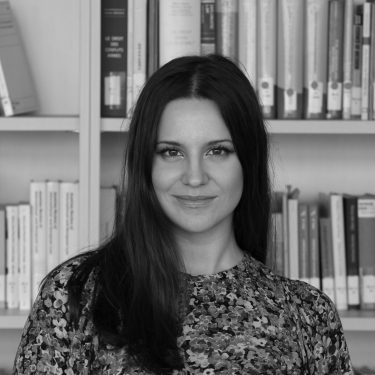Welcome to the latest interview of the Völkerrechtsblog’s symposium ‘The Person behind the Academic’! With us we have Dr. Giulia Raimondo, and through the following questions, we will try to get a glimpse of his interests, sources of inspiration and habits.
Welcome Dr. Raimondo and thank you very much for accepting our invitation!
Thank you! I am still wondering whether I really fit into this series of interviews with some of my intellectual heroes…
May I first ask, as I usually do, what it was that brought you to academia and what made you stay?
After graduation, I felt I wanted to stay with my head in the books for some more time. So, I applied for an LL.M. at McGill. There, I got the impression that academia was about taking responsibility for our shared world while trying to understand something of it together. I wanted to try to do it as a profession, and I feel very lucky to have done so until now.
I think there is still nothing that is keeping me in, except a good mix of stubbornness and luck. At the moment, I am living in Luxembourg with my 3-year-old daughter, while my partner works in Switzerland, where we were living together before. I am aware I am very fortunate to have his support and to have found a job in such a welcoming and resourceful country, but sometimes it also feels hard. Sometimes it feels like I am on the top of a mountain, sometimes it feels like I am drowning in my own thoughts and timelines.
What sparked your interest in international migration and human rights law in particular?
Like most human beings, migration is part of my family history and lived experience. But what brought me to start researching international refugee law for the first time was an internship with an appeal judge in Milan. She was dealing with a lot of asylum claims, and I got interested in how law structures migration processes. Ever since, I kept cultivating this interest from a practical and theoretical perspective.
I taught Italian to some asylum seekers in my village – and I learned so much. During my PhD – far from real people – what kept me inspired were, in particular, theoretical and critical contributions to the scholarship as diverse as Itamar Mann’s Humanity at Sea, Tendayi Achiume’s ‘Migration as Decolonization’, and everything by B.S. Chimni.
If you were not an academic, what would you be?
I would have loved to become an artist, but I was too insecure to jump into art school. I would have loved to study philosophy, but coming from a working-class family, I was persuaded I would not be able to sustain myself economically after graduation – ‘You can draw or read philosophy in your spare time, do something sensible!’…
At the time, law school seemed the closest to philosophy and easier to justify to parents that were afraid for my future. I was the first person in my family to go to university, and now that I am myself a parent, it is hard to begrudge my father who convinced me to study law.
So, if I was not editing footnotes (which I secretly love), I would love to work in an independent bookshop hosting exhibitions and reading groups, all possibly accompanied by some nice coffee.
Which are three texts that you would wish all academics working on international law would read?
There are too many, and I feel too ignorant to really be able to give suggestions, even more so where some might expect original suggestions that would go beyond the classical or the usual (critical) suspects.
But I can give you some titles I am reading or that I am waiting to read. I am reading (I am still one of the few, I guess) Ntina Tzouvala’s Capitalism as Civilisation and Samantha Besson’s Theories of International Responsibility Law. Especially on international migration law, I am impatiently waiting to read Chantal Thomas’, Disorderly Borders: How International Law Shapes Irregular Migration.
Are you disappointed in international law? Why (not)?
I am disappointed in international lawyers, not in international law. But I am also a firm believer in the ‘optimism of the will’…
What is your favourite place to read and write? What is always near you when you read and write?
During my university studies in Italy, it used to be my room at my parents’ house, in a small (very small) village in the Italian Alps. The silence, interrupted by the sounds of nature, or my brother playing the piano (more or less well), is still in my ears when I try to concentrate. It’s like my body remembers how it felt to be so deeply concentrated on studying tort or canon law. Now, the best place is anywhere where I can sit in silence for more than 10 minutes!
What is an energy and inspiration booster, at times when you have none?
A sense of anger with the real. It might be narcissistic and inconsequential, but I find solace in researching and writing about this discomfort in legal terms. More concretely, when I am really in need of a positive recharge, I either go out for a run, or talk to friends and colleagues. I am very lucky to have wonderful colleagues with whom I’m sharing my postdoctoral journey.
Have you ever drawn influence from any form of art in your work? Is there anything artistic about writing academic texts?
Of course. Writing is a form of art, even writing for academic purposes… I am often inspired by visual arts when I write, most often it is photography.
At the same time, I am fascinated by the work of Susan Sontag, where she reflects on the power of images and their ability to alert and shock us, but also criticises their mediation and the loss of complexity that they bring. In a sense, photography is “a defense against anxiety”, it creates some distance between us and the real. We are constantly exposed to photos of the suffering of others, and little by little, those photos become banal or voyeuristic. In a sense, photos can aestheticise horrors that were unimaginable. For her, to take pictures is, simultaneously, to confer value and to render banal. Mindful of that, I always try to use photos with caution in my work, but I still do, especially when I present. The second image of this photo gallery is an example of a photo I used for my PhD defence, talking about the European responsibility for migrant rights violations.
Would you like to share with us a ‘sacrifice’ that you have made for your work? Do you regret it?
I am not sure I would use the word sacrifice (maybe this is my Catholic upbringing or the influence of René Girard, or both) … but I have certainly imposed my absence (either physical or mental) on many people I love. And, even if they understand and support me, I do regret it.
Do you feel stressed before lectures or conference presentations? What do you do/have you done to cope with this feeling?
Always! And essentially, I let it go by preparing as much as I can. I do not have any sort of techniques to cope with it – even if I like sharing some of those techniques with moot court students, I don’t practice what I preach…
What is the best and worst part of being an academic?
There are so many! The flexibility and freedom that this work gives you, but also its invisible constraints. The pain of writing and the joy of printing a piece where you feel you put something of yourself in. The freedom of being your work and the inhibition and insecurity of being seen. I could go on…Despite all the contradictions (by no means unique to academia), I feel fortunate (ad incredibly privileged) to be able to read, write, and talk about things I care about for a living.
If you could, which unspoken rule of academia would you instantly erase?
There are many ‘spoken rules’ that I would erase before going into the unspoken ones – such as the precarious and overwhelming working conditions of academics in many countries.
When it comes to the (more or less) unspoken, I would erase the ‘publish or perish’ rule, and, more fundamentally, the competitive environment that we navigate. Both have a damaging impact on the intellectual and pedagogical work that universities (should) do.
If I may add another unspoken rule, I would add the mobility requirements that many ECRs have to fulfil to get funding or more stable positions. While I appreciate the value of academic mobility for genuine intellectual growth and exchanges, I am not sure that requiring a 30 or even 40-year-old researcher to move every two or three years has much to do with intellectual stimulation. At the same time, I am aware of my privilege as a white, European, and heterosexual woman. For example, academic jobs in other countries might be logistically complicated, but still possible. To travel or relocate to most places, I do not need a visa, and if I do, it is quite simple to get one. This is not the case for too many people.
Ideally, whom would you want to find waiting for a meeting with you outside your office next Monday?
I would reverse the situation and be myself, the person knocking at the door of a small and dusty office, at the Court of Milan. The office is that of Judge Loretta Dorigo. During my undergraduate studies, I was lucky to assist her in asylum appeals. Her work was as rigorous as humane – a rarity if you consider that many lawyers did not remember the name of their clients. It was thanks to her that I got interested in asylum law – even if she was always trying to convince me to start the judge school (another sensible decision, indeed). Every time I was back in Milan, I would think about stopping by her office, but then never did. When I learned she passed away a couple of years ago, I realised I would not have that chance anymore. I take your question as an occasion to make that meeting happen, at least in my imagination.
What are you working on currently? What may we anticipate in the near future?
I am working on a book on the impact of the European integrated border management on migrant rights. I focus on Frontex’s (the European Border and Coast Guard Agency) human rights duties and on the attribution of responsibility for their breach. In particular, I explore how international responsibility can be conceived in a context in which borders are increasingly managed and secured by supranational institutions and legitimised in a post-national fashion. In parallel, as part of the SHARED Project, I am working on Frontex’s immunities when it operates in third states.
I very much look forward to reading your work on these topics.
Thank you very much, Dr. Raimondo, for participating in our symposium and for having taken the time to respond to our questions!
Thank you! I am still wondering whether I really belong in this series of interviews, but I am also honoured to participate in this conversation.
It’s a pleasure to have you! Perhaps, I should share with you and our readers that some more senior academics who have contributed to the symposium were also skeptical in the beginning, and expressed their fear that their interviews would not be sufficiently interesting for our readers. It seems that this was not the case, and that the participation in the symposium of persons at all stages of academic careers is valuable.

Dr Giulia Raimondo is a postdoctoral researcher at the University of Luxembourg (Faculty of Law Economics and Finance) . Her research interests lie in public international law, international and EU
migration law, and legal philosophy.

